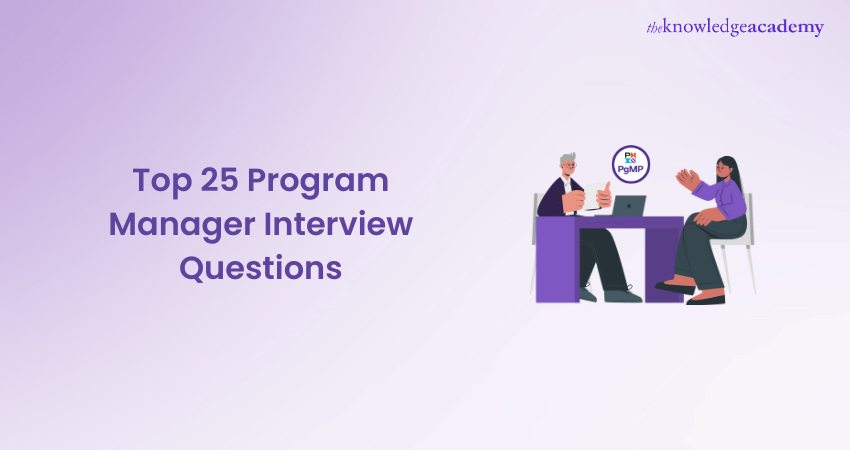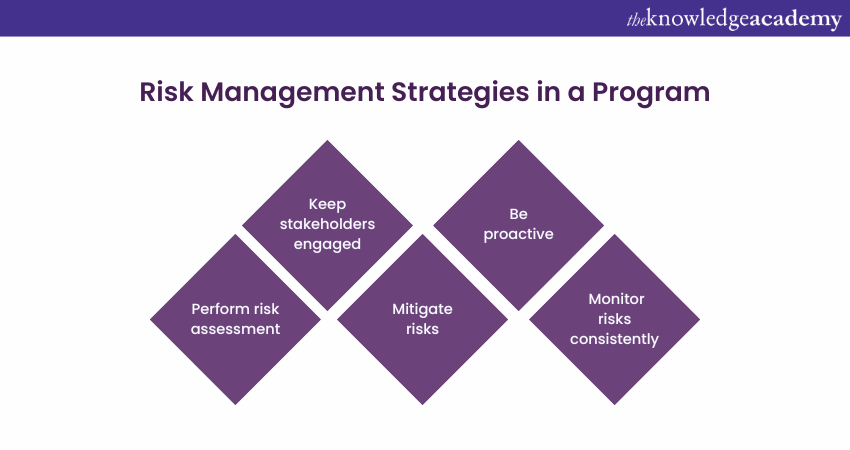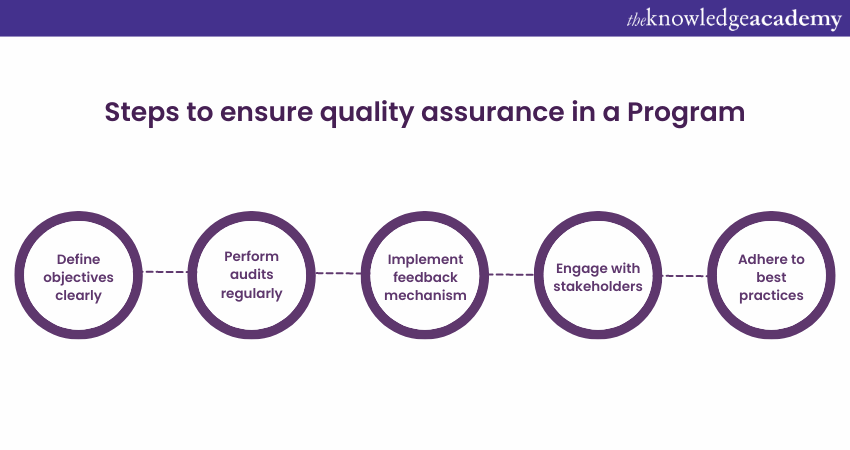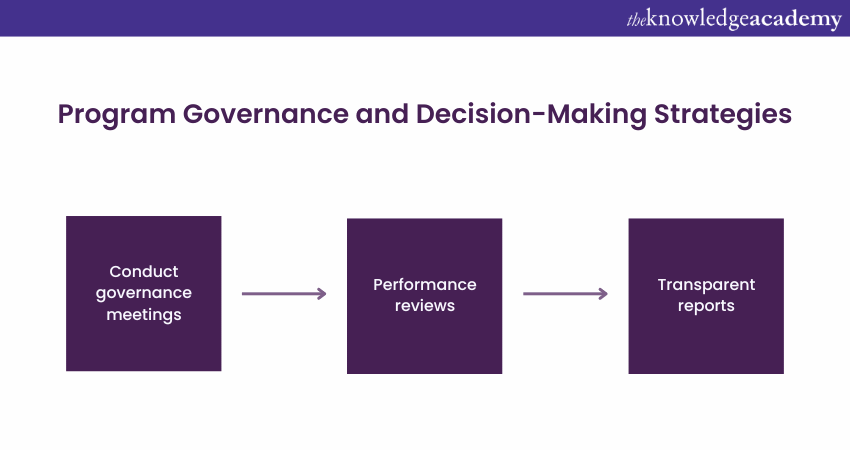We may not have the course you’re looking for. If you enquire or give us a call on +357 26030221 and speak to our training experts, we may still be able to help with your training requirements.
Training Outcomes Within Your Budget!
We ensure quality, budget-alignment, and timely delivery by our expert instructors.

In this era of hyper-competition, Program Management plays a crucial role in driving successful outcomes. As organisations undertake complex initiatives and projects, the need for skilled Program Managers becomes paramount. Whether aspiring to enter the field or looking to advance your Program Management career, Preparing for the Program Manager Interview Questions can help you crack the interview easily.
A Program Manager earns an average of £50,462 per year. Read this blog to learn about the top 25 Program Manager Interview Questions with answers and easily crack the interview!
Table of Contents
1) Program Manager Interview Questions and Answers
a) What is Program Management, and how does it differ from Project Management?
b) How do you handle conflicting priorities in a program?
c) What strategies do you use for risk management in a program?
d) How do you adapt if a company changes its goals halfway through a project?
e) How do you ensure effective communication within a program team?
f) How do you manage stakeholders in a program?
g) Can you describe a situation where you had to deal with a difficult team member?
h) How do you measure the success of a program?
i) How do you handle changes in scope during a program?
j) What methods do you use for tracking and reporting program progress?
k) What techniques do you use for resource allocation in a program?
l) Can you provide an example of a successful program you managed and the challenges you faced?
2) Conclusion
Program Management Interview Questions
We have prepared a thoroughly detailed list of the top 25 Program Manager Interview Questions along with their detailed response. Being aware of the basic principles and ideas behind the questions you are asked will educate you and help you provide effective and convincing answers.
1) What is Program Management, and how does it differ from Project Management?
Program Management involves handling a group of related projects, called a program, to meet specific goals of an organisation. It includes organising different projects, resources, and people to make sure they all work towards the overall objectives. Program Managers manage everything about the program from start to finish. They focus on big-picture planning, managing relationships with stakeholders, dealing with risks, and making sure the program delivers the benefits it promised.
On the other hand, Project Management deals with running individual projects within a program. Project Managers are in charge of organising, carrying out, keeping an eye on, and controlling the tasks needed to achieve a particular result. This has to be done within certain limits like time, budget, and quality. Project Management is more about day-to-day operations and making sure specific project goals are met with the available resources.

2) How do you handle conflicting priorities in a program?
When complex choices take place, it is more important to develop clear principles of prioritisation based on the importance of the strategic project goals and the level of alignment with the organisation’s objectives. Engage key stakeholders and other decision-makers in discussion to understand their perspectives and concerns. Through open communication and negotiation, seek agreement on the priority order or find compromises that can address conflicting interests and achieve the best results for the program
3) What strategies do you use for risk management in a program?

Risk management is essential to program management in identifying, assessing, mitigating, and monitoring risks that can impact the project's success. In order to effectively manage risks, include the following:
a) Conducting thorough risk assessments at regular intervals
b) Engaging stakeholders to gather diverse perspectives on potential risks
c) Developing robust risk mitigation plans
d) Establishing a culture of risk awareness and proactive risk response within the project team
e) Monitoring and tracking risks throughout the program lifecycle
Take charge of risk management excellence and elevate your project management skills with our PMI-RMP® Certification Training – Sign up now!
4) How do you ensure effective communication within a program team?
Effective communication is vital for project success, enabling seamless collaboration, shared understanding, and alignment among team members. To ensure effective communication within a program team, various strategies are adopted, including:
a) Establishing clear communication channels and protocols
b) Conducting regular team meetings and updates
c) Using collaboration tools and technologies
d) Fostering a culture of open dialogue and knowledge sharing
e) Tailoring communication approaches to meet diverse needs and preferences
5) How do you manage stakeholders in a Program?
Stakeholder management is essential for project success. Identify key stakeholders, understand their expectations and interests, establish strong relationships, and engage them throughout the program lifecycle through effective communication and timely updates.
6) Can you describe a situation where you had to deal with a difficult team member?
“Dealing with difficult team members is a challenge that Program Managers encounter daily. In one such instance, I encountered a team member who consistently resisted change and exhibited disruptive behaviour. I handled the difficult team members by using the following skills and techniques:
a) Empathy
c) Conflict resolution skills
d) Clear expectations
e) Address concerns promptly
f) providing support and guidance
g) Fostering a positive and inclusive team environment"
7) How do you measure the success of a program?
“To check if a program is successful, I need to set clear goals and ways to measure how well it is doing. These measures might include things like how much money it saves, if it is running on time, how happy the customers are, and the value it brings to the business. It is also important to see if the results match what was originally planned. By keeping an eye on these things regularly during the program, I can understand how it is progressing. This allows you to make the necessary changes to improve it and ensure it does well.”
8) How do you handle changes in scope during a Program?
Changes in scope are common in Program Management. Effective scope management includes thorough impact assessments, change control processes, stakeholder engagement, and consideration of resource and schedule implications.
9) What techniques do you use for resource allocation in a Program?
Resource allocation involves assigning and managing resources across multiple projects. Techniques include resource levelling, optimisation, capacity planning, and considering skill sets, availability, and project priorities.
10) Can you provide an example of a successful Program you managed and the challenges you faced?
“I managed a big project where I set up a system to manage customer relationships for a large international company. The goal was to put all customer information in one place, make processes smoother, and improve how to connect with customers across different parts of the business and the world.
I faced several issues during the project, including staff not being keen on the new system, difficulties in transferring old customer data into the new system, and keeping everyone who had a stake in the project happy.
I tackled these problems by managing changes carefully, planning thoroughly, and making sure everyone involved was on the same page. In the end, the project was successful within the planned time and budget, leading to a better understanding of customer needs, smoother processes, and higher customer satisfaction.”
11) How do you foster collaboration and teamwork in a program?
Promoting collaboration and teamwork is essential for project success. Strategies for fostering collaboration and teamwork include:
a) Establishing a culture of trust and respect
b) Facilitating cross-functional collaboration
c) Promoting knowledge sharing
d) Providing skill development opportunities
e) Recognising team contributions
12) How do you ensure quality assurance in a Program?

“Quality assurance in Program Management involves establishing processes, standards, and practices to ensure deliverables meet the defined quality criteria. I ensure quality assurance through various activities, including:
a) Defining clear quality objectives and metrics
b) Conducting regular quality reviews and audits
c) Implementing a robust feedback and improvement mechanism
d) Collaboration with stakeholders and subject matter experts
e) Ensuring that the program's deliverables adhere to industry best practices
Furthermore, implementing quality assurance throughout the project’s lifecycle, from planning to execution and delivery, reinforces a culture of quality and continuous improvement.
Understand portfolio management, governance, and stakeholder engagement with our Program Management Professional (PgMP)® Certification Training –join today
13) How do you handle changes in program priorities?
"Tight deadlines can be challenging in Program Management. In order to handle them effectively, I prioritise tasks, allocate resources wisely, streamline processes, communicate expectations clearly, and leverage efficient Project Management methodologies.”
Unleash your project management potential and equip yourself with the skills needed to excel with our PMI Project Management Ready Training.
14) How do you handle conflicts between different program stakeholders?
Conflicts between stakeholders are common in Program Management. Effective conflict resolution involves active listening, empathy, facilitation, negotiation, and finding win-win solutions. Strive to create an environment of consensus-building and collaboration.
Act as a mediator, understanding the concerns and interests of each stakeholder and working towards a resolution that addresses those concerns while aligning with the project goals. Here's how you can manage conflicts and foster positive stakeholder relationships within the Program:
a) Encourage open and respectful communication
b) Acknowledge diverse perspectives
c) Focus on shared objectives
15) How do you keep the program team motivated and engaged?
Motivating and engaging the program team is vital for success. Encourage team members to contribute their ideas and feedback, allowing them to take ownership of their work and make meaningful contributions to the project's success. Here's how that can be achieved that:
a) Provide clear goals and expectations
b) Recognise and celebrate achievements
c) Foster a positive work environment
d) Offer professional development opportunities
e) Ensure open lines of communication
Regularly communicate the project progress and the impact of the team's efforts, creating a sense of purpose and shared accomplishments. Additionally, establishing a supportive and inclusive team culture, promoting work-life balance, and offering rewards and recognition for exceptional performance contribute to keeping the program team motivated and engaged.
16) How do you handle Program budgeting and financial management?
"Managing project budgets and finances requires careful planning, monitoring expenses, tracking financial performance, identifying cost-saving opportunities, and ensuring adherence to financial guidelines and regulations.
I establish a budgeting framework that aligns with the Program's objectives and resource requirements. This includes the following tasks:
a) Estimating costs
b) Allocating resources
c) Defining financial controls
Regularly monitoring and tracking expenses against the budget enables proactive identification of deviations or variances. I ensure that the project's financial resources are utilised efficiently and transparently by implementing effective financial management practices such as cost forecasting, risk assessment, and financial reporting.”
17) How do you ensure alignment between a Program and organisational goals?
“To make sure a project helps achieve the overall goals of an organisation, it is important to keep the project in line with what the organisation wants to achieve. I do this by really understanding what the organisation aims to do, what's important to it, and what limits it has.
This involves talking regularly with important people involved in the project, checking frequently to make sure the project still fits with the organisation's changing needs, and clearly explaining how the project's goals and results relate to the organisation's objectives.
By involving top leaders and key decision-makers in the project, I help create a common goal and encourage everyone to feel they own it and support what they are trying to achieve. This ensures the project truly helps the organisation succeed.”
18) How do you handle program dependencies and interdependencies?
Managing project dependencies and interdependencies is essential to ensure smooth execution and minimise risks. I identify and analyse dependencies during the early stages by clearly understanding the relationships and impacts between different projects, stakeholders, and external factors. This includes mapping out the dependencies, tracking and communicating interdependencies, and establishing mechanisms for resolving conflicts or addressing changes in dependencies. By actively managing and mitigating risks associated with dependencies, I can proactively address potential disruptions or delays, maintaining the process's overall progress and successful delivery.
19) How do you approach program governance and decision-making?

Program governance involves establishing the framework, processes, and structures to make informed decisions, monitor program progress, and ensure accountability. I approach Program governance by defining clear roles, responsibilities, and decision-making authority for different stakeholders and governance bodies.
This includes establishing regular governance meetings, conducting performance reviews, and providing transparent reporting on process status, risks, and key decisions. By engaging stakeholders and aligning decision-making processes with the process objectives, I can facilitate effective governance, ensuring that decisions are made in a timely and informed manner and that the Program remains on track to achieve its goals.
20) How do you ensure knowledge transfer and organisational learning from a Program?
Knowledge transfer and organisational learning are vital for sustaining the process outcomes and enhancing future initiatives. Knowledge transfer can be ensured by capturing and documenting lessons learned, best practices, and insights throughout the program's lifecycle.
This includes developing knowledge repositories, conducting post-implementation reviews, and facilitating workshops or training sessions to share the process experiences and key takeaways with relevant stakeholders.
21) How do you adapt if a company changes its goals halfway through a project?
When a company changes its goals midway, it is crucial to reassess the project scope, resources, and timelines to align with the new objectives. This involves engaging stakeholders to understand the new goals, revising the project plans, and communicating changes effectively to the team. Flexibility and quick response in strategy and execution are key to adapting smoothly.
Learn how to apply a quality and integration management plan with our CAPM® Certification Training – join today!
22) What methods do you use for tracking and reporting program progress?
For tracking and reporting program progress, a combination of quantitative and qualitative methods is used, including Gantt charts, dashboards, and regular status reports that detail milestones, resource allocation, and budget status. Regular meetings with stakeholders and the use of Project Management software also ensure transparency and timely updates.
23) How do you integrate new technologies or processes into an existing program?
Integrating new technologies or processes involves a strategic approach that includes assessing the compatibility and potential impact on current program outcomes. This is followed by pilot testing, training for team members, and phased implementation. Continuous monitoring and feedback loops help to smooth the integration process and ensure that the new technologies contribute positively to the program’s objectives.
24) Can you explain how you develop and maintain a program vision and strategy?
Developing and maintaining a program vision and strategy starts with a clear understanding of organisational goals and stakeholder expectations. This vision is then translated into actionable and measurable program objectives. Regular strategy reviews and adjustments ensure the program remains aligned with the changing business environment and organisational priorities, keeping the program on track towards its long-term goals.
25) How do you handle regulatory and compliance issues in your programs?
To manage regulatory and compliance issues within the programs, start by ensuring a thorough understanding of all relevant legal and regulatory requirements that impact on the program. This involves close collaboration with legal and compliance departments to interpret these regulations accurately. I then integrate compliance requirements into the program planning and execution phases, setting up regular compliance audits and checks throughout the program's lifecycle.
Conclusion
We hope you read and understood everything about Program Manager Interview Questions. Mastering these questions is essential for success in the field. By preparing thoughtful responses and showcasing expertise in collaboration, quality assurance, and decision-making, you can impress recruiters and managers and increase your chances of securing Program Manager roles.
Learn the evolution and principles of Project Management with our PMP® Certification Training – join today!
Frequently Asked Questions
Upcoming Project Management Resources Batches & Dates
Date
 PMP® Certification Training Course
PMP® Certification Training Course
Mon 16th Dec 2024
Mon 6th Jan 2025
Mon 13th Jan 2025
Mon 20th Jan 2025
Mon 27th Jan 2025
Mon 3rd Feb 2025
Mon 10th Feb 2025
Mon 17th Feb 2025
Mon 24th Feb 2025
Mon 3rd Mar 2025
Mon 10th Mar 2025
Mon 17th Mar 2025
Mon 24th Mar 2025
Mon 31st Mar 2025
Mon 7th Apr 2025
Mon 14th Apr 2025
Tue 22nd Apr 2025
Mon 28th Apr 2025
Tue 6th May 2025
Mon 12th May 2025
Mon 19th May 2025
Tue 27th May 2025
Mon 2nd Jun 2025
Mon 9th Jun 2025
Mon 16th Jun 2025
Mon 23rd Jun 2025
Mon 30th Jun 2025
Mon 7th Jul 2025
Mon 14th Jul 2025
Mon 21st Jul 2025
Mon 28th Jul 2025
Mon 4th Aug 2025
Mon 11th Aug 2025
Mon 18th Aug 2025
Tue 26th Aug 2025
Mon 1st Sep 2025
Mon 8th Sep 2025
Mon 15th Sep 2025
Mon 22nd Sep 2025
Mon 29th Sep 2025
Mon 6th Oct 2025
Mon 13th Oct 2025
Mon 20th Oct 2025
Mon 27th Oct 2025
Mon 3rd Nov 2025
Mon 10th Nov 2025
Mon 17th Nov 2025
Mon 24th Nov 2025
Mon 1st Dec 2025
Mon 8th Dec 2025
Mon 15th Dec 2025







 Top Rated Course
Top Rated Course


 If you wish to make any changes to your course, please
If you wish to make any changes to your course, please


